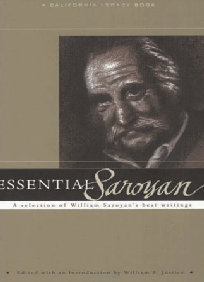Pateel Mekhitarian
 A discussion on the book Essential Saroyan, a collection of William Saroyan’s works, was held in the Politi Branch of the County Library on Wednesday, November 12. Essential Saroyan includes short stories and excerpts from some of Saroyan’s best known novels. Led by Professor Barlow Der Mugrdechian, Coordinator of the Armenian Studies Program, the talk included a biographical history of Saroyan and aspects of his life that were influential in his writing.
A discussion on the book Essential Saroyan, a collection of William Saroyan’s works, was held in the Politi Branch of the County Library on Wednesday, November 12. Essential Saroyan includes short stories and excerpts from some of Saroyan’s best known novels. Led by Professor Barlow Der Mugrdechian, Coordinator of the Armenian Studies Program, the talk included a biographical history of Saroyan and aspects of his life that were influential in his writing.
The Fresno County Library organized the discussion and participants were given free copies of the book to read before coming. The audience was prepared to offer their opinions on the book and also had many questions concerning the author, or about specific works in the book.
Prof. Der Mugrdechian began by reading excerpts and commenting on themes such as family, youth, truth, relationships, and equality. Three major themes were discussed: Saroyan’s identity as an ethnic writer, his ideas on the power of love, and the importance of childhood.
William Saroyan was born in Fresno, California in 1908 to Armenian immigrants from Bitlis, Armenia. At the young age of three, Saroyan’s father died, forcing Saroyan and his brother and two sisters to be placed in the Fred Finch Orphanage in Oakland, California. Growing up, Saroyan learned to support himself, working a variety of jobs. He decided he wanted to become a writer after his mother showed him some of his father’s writings.
In his short story,Seventy Thousand Assyrians, Saroyan connects with an Assyrian barber, through whose eyes he tells the story. “They, the Assyrians, came from our part of the world, they had noses like our noses, eyes like our eyes, hearts like our hearts. They had a different language” (Essential Saroyan, 13). Saroyan believes in humanity as being one. He explains how he does not believe in racial differences because this leads to alienation and separation. He thought of all people as members of the human race and that they represented the brotherhood of man. The ideas that Saroyan expressed through his writing are directly related to his experiences as a child. Having lived in an orphanage for five years, Saroyan felt abandoned and isolated. All he wanted was to be included in the human race.
Saroyan also emphasized the complexity of love and his anti-war stance in his writings. He did approve of the idea of war because he believed there are different ways to handle issues, without physical aggression. He discusses the reality of death and how it corrupts the innocence of children.
In The Human Comedy, Saroyan tells the story of a young Homer, who is assigned to deliver a telegram announcing the death of a soldier. Homer is forced to witness the effects of the reality of death on the lady, Mrs. Rosa Sandoval, to whom he delivers the telegram, announcing the death of her child in the war. This can be related to Saroyan’s own childhood, when his father died, and when he was forced to accept the reality of death.
The third major theme that is present in Saroyan’s works is childhood, and the related innocence. The Human Comedy includes a child named Ulysses. The story is told through the eyes and mind of Ulysses. The world seems simple, innocent, and fresh. Saroyan describes Ulysses as living in a big, wondrous world, where Ulysses has to quickly grow up due to the many realities he faces.
Essential Saroyan is a great collection of short stories and excerpts by William Saroyan. Included, in whole or in part, are The Daring Young Man on the Flying Trapeze, Five Ripe Pears, The Great Unwritten American Novel, Antranik of Armenia, Radio Player, and excerpts from books such as The Human Comedy, The Adventures of Wesley Jackson, and The Bicycle Rider in Beverly Hills.
Saroyan’s works are unique and touching, and for these reasons, his works are still widely read today.
 Hye Sharzhoom Armenian Action
Hye Sharzhoom Armenian Action